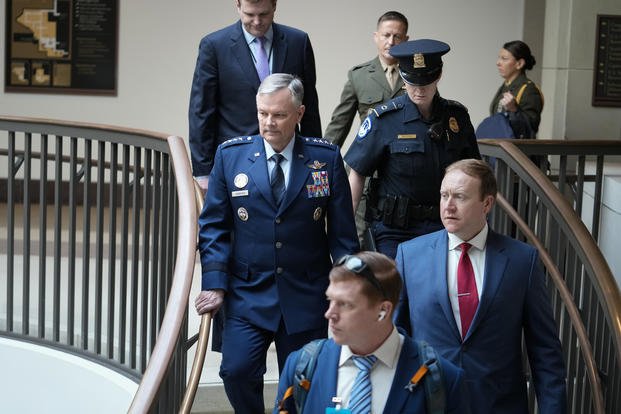Defense officials on Thursday defended their response to a suspected Chinese spy balloon that flew over the continental United States but struggled to satisfy furious senators at the first public hearing on the incident.
A key subcommittee held a hearing that was part of a balloon-centric day on Capitol Hill a week after the Pentagon first disclosed that the craft was traversing the U.S. heartland. The full Senate also received a classified briefing, as did the full House. And the House voted unanimously to condemn China for its "brazen violation of U.S. sovereignty."
The classified briefing appeared to quell some lawmakers' concerns. Sen. Jon Tester, D-Mont., the chairman of the defense appropriations subcommittee, excoriated Pentagon officials at his panel's hearing, proclaiming that he didn't "want a damn balloon going over the United States when we could've taken it down over the Aleutian Islands," referencing the island chain in Alaska that sweeps across the Pacific Ocean. But after the classified briefing, Tester told reporters he was satisfied and that officials gave "more concrete answers."
Read Next: 2 US Army Veterans Deported to Mexico Win US Citizenship
Still, in public, officials struggled to explain why the balloon was not considered a threat as soon as it was discovered near Alaska, whether they know what China was spying on, and what actions they would take against any future balloons.
"I respect the need to keep some of this classified, but we all understand that some of the desire to keep things classified has to do with not wanting to disclose to the public things that might be inconvenient politically for the department," Sen. Brian Schatz, D-Hawaii, said at the public hearing.
The Chinese balloon, which the U.S. government alleges was conducting surveillance but which China maintains was a weather balloon, has been an object of public fascination since it was spotted in the sky over Montana last week. In Congress, it immediately sparked concern about what the incident means for the threat posed by China.
The balloon first came to the U.S. military's attention when it entered the Alaskan Air Defense Identification Zone on Jan. 28, according to the Pentagon. It then briefly flew over Alaska before moving over Canada. Then, on Jan. 31, it flew back into U.S. airspace and continued to fly east across the country until it was shot down Saturday by an F-22 Raptor while it was over the Atlantic Ocean off the South Carolina coast.
The Biden administration has said it did not shoot down the dirigible earlier because of the risk of debris injuring a bystander on the ground, because the balloon provided little added intelligence-gathering capabilities beyond China's spy satellites and because the U.S. itself could gather intelligence from watching the balloon's flight.
Pressed repeatedly at the hearing about why the balloon entering Alaskan airspace was not treated with the same urgency it was when the balloon entered the lower 48 and why it was not shot down when it was over the Bering Sea or remote areas of the state with little risk of collateral injuries, defense officials said the craft didn't display a hostile intent and that its path over the state did not take it to sensitive sites.
That explanation rankled senators, in particular Sen. Lisa Murkowski, R-Alaska.
"I am so angry. I want to use other words, but I'm not going to," Murkowski said. "Seems to me the clear message to China is, 'We got free range in Alaska.'"
The classified briefing later did not assuage Murkowski, who told reporters afterward that she felt like her state "gets treated differently, and when it comes to national security, national defense, no state should feel like they are more vulnerable than the rest."
Toward the end of the public hearing after an hour of getting beaten up by senators, officials also argued that recovering the balloon debris would have been difficult in Alaska's harsh terrain and that shooting it down too early could have set a dangerous precedent.
"Once you take a shot, you can't get it back," Lt. Gen. Douglas Sims II, director for operations of the Joint Staff, told senators. "I think it's important for us to remember that if we establish that precedent, that we may meet the same precedent."
After several attempts by Tester to ask whether the United States knows what information China was trying to gather, Jedidiah Royal, principal deputy assistant secretary of defense for Indo-Pacific security affairs, said only that "we have some very good guesses" but deferred a more specific answer to the classified briefing.
Questioned about how the military plans to deal with any future balloons, Melissa Dalton, assistant secretary of defense for homeland defense and hemispheric affairs, said officials are still learning about the balloon's capabilities and what would be needed to counter them as debris is collected.
While the classified briefing allayed some concerns from the Biden administration's allies in Congress, they also said the United States needs to better prepare for future incidents.
"The United States should not have a domain awareness gap," Senate Foreign Relations Committee Chairman Bob Menendez, D-N.J., told reporters, echoing the phrasing U.S. Northern Command commander Gen. Glen VanHerck used to explain why the military did not detect previous balloons in real time. "We have to be able to understand everything that may be coming toward our country, in every dimension -- space, continental parts of our country. And so that's something that I think we need to be working on."
Menendez also said the United States needs to craft a policy response to make Chinese President Xi Jinping "understand that there are consequences for this action."
-- Rebecca Kheel can be reached at rebecca.kheel@military.com. Follow her on Twitter @reporterkheel.
Related: US Says Chinese Military Behind Vast Aerial Spy Program













